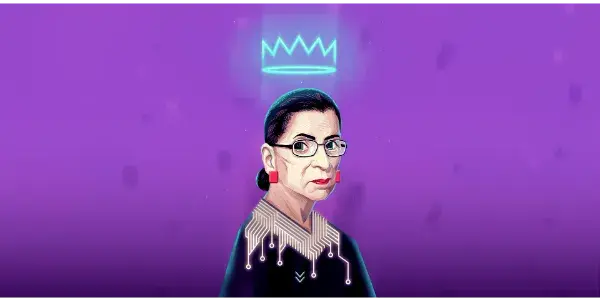Ask-rbg

Interact with an experimental virtual version of Justice Ruth Bader Ginsburg and get answers to your questions
Ask-rbg: An AI-Powered Legal Assistant Inspired by Justice Ginsburg
Ask-rbg is a fascinating new AI tool that allows users to interact with a virtual version of the late Supreme Court Justice Ruth Bader Ginsburg. This experimental tool provides answers to user questions, offering a unique blend of legal insight and historical context. Its free accessibility and innovative approach make it a noteworthy development in the field of AI-powered legal assistants.
What Ask-rbg Does
Ask-rbg leverages advanced natural language processing (NLP) and machine learning (ML) to simulate a conversation with Justice Ginsburg. It doesn't claim to provide actual legal advice (a crucial disclaimer), but instead aims to offer informed responses based on Justice Ginsburg's known opinions, writings, and public statements. The tool draws upon a vast dataset of her work to generate text that mimics her style and perspective. Think of it as a sophisticated chatbot informed by the rich legacy of a highly influential legal mind.
Main Features and Benefits
- Accessibility: The tool is completely free to use, making a wealth of information accessible to a wide audience.
- Educational Value: Interacting with Ask-rbg provides a unique learning opportunity. Users can explore complex legal concepts through the lens of Justice Ginsburg's insightful commentary.
- Engaging Interface: The conversational format makes the learning process more engaging and approachable than traditional legal research methods.
- Historical Context: Ask-rbg offers a glimpse into the history of landmark legal cases and the evolution of legal thought, contextualizing information within the framework of Justice Ginsburg's career.
Use Cases and Applications
Ask-rbg has several potential applications:
- Legal Education: Students can use the tool to explore legal concepts and engage with different perspectives on important cases.
- Historical Research: Researchers can use Ask-rbg as a starting point for investigating Justice Ginsburg's opinions and understanding her contributions to the law.
- Public Engagement: The tool can be used to raise awareness of important legal issues and promote informed discussion.
- Casual Learning: Individuals interested in law or Justice Ginsburg's legacy can use the tool to learn in a fun and interactive way.
Comparison to Similar Tools
While several other AI-powered legal research tools exist, Ask-rbg stands out due to its unique focus on simulating a conversation with a specific, highly respected legal figure. Most other tools focus on providing straightforward legal information or assisting with legal research tasks. Ask-rbg, however, offers a more engaging and personalized experience, focusing on conveying the insights and perspective of Justice Ginsburg. It's less about finding specific legal precedent and more about understanding a legal perspective.
Other tools might offer more comprehensive legal research capabilities, but they lack the historical and educational context that Ask-rbg provides. This makes Ask-rbg a valuable supplement to, rather than a replacement for, more traditional legal research tools.
Pricing Information
Ask-rbg is currently free to use.
Conclusion
Ask-rbg is a novel and exciting application of AI in the legal field. While not a replacement for professional legal advice or exhaustive legal research, it offers a valuable tool for education, historical exploration, and public engagement. Its free accessibility further enhances its potential impact, making it a significant contribution to the evolving landscape of AI-powered legal assistance. Its unique approach to providing information through a simulated conversation with Justice Ginsburg sets it apart from other legal research tools and makes it a worthwhile resource for students, researchers, and anyone interested in exploring American legal history and jurisprudence.